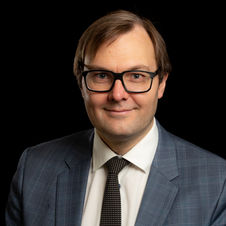top of page
Our People
Senior Supervisors
All DREAM+PLAN Doctoral Candidates (DC's) will have a Senior and Associate Supervisor from their employing institution in Europe. DC's recruited under the double degree conditions will have a Senior and Associate supervisor from both the Employing Institution in Europe, as well as the same from RMIT University, Australia. DC's will also have a dedicated Industry Partner Mentor PLUS flexible access to a wider pool of EU-based Industry Partner Mentors, through the ISPIM extensive network.
Click on the images below for introductions to our Senior Supervisors.

Prof. Tor Helge Aas
University of Agder, Agder, Norway.

Prof. Laura Albareda
LUT University, Lappeenranta, Finland.

Assoc. Prof. Kevin Argus
RMIT University, Melbourne, Australia.

Prof. José Luis Cortina
Universitat Politècnica de Catalunya, BarcelonaTech, Barcelona, Spain.

Dr. Justyna Dąbrowska
RMIT University, Melbourne, Australia.

Prof. Lina Dagilienė
Kaunas University of Technology, Kaunas, Lithuania.

Prof. Cameron Duff
RMIT University, Melbourne, Australia.

Assoc. Prof. Anupam Dutta
University of Vaasa, Vaasa, Finland.

Prof. Bernardo Figueiredo
RMIT University, Melbourne, Australia.

Prof. Matthias Fink
Matthias Fink is a full professor of innovation management at JKU Linz, Austria and a full professor of strategy & leadership at Grenoble Ecole de Management, France.

Prof. Henri Hakala
LUT University, Lappeenranta, Finland.

Assoc. Prof. Aki Harima
Tallinn University of Technology (TalTech), Tallinn, Estonia.

Prof. Petri Helo
University of Vaasa, Vaasa, Finland.

Prof. Afreen Huq
RMIT University, Melbourne, Australia.

Prof. Jega Jegatheesan
RMIT University, Melbourne, Australia.

Assoc. Prof. Joona Keränen
RMIT University, Melbourne, Australia.

Prof. Tanel Kerikmäe
Tallinn University of Technology (TalTech), Tallinn, Estonia.
Tanel Kerikmäe is a professor of European Legal Policy and Law & Tech at Tallinn University of Technology (TalTech), and he has a worldwide experience from different universities in teaching and research. Tanel has been invited visiting professor in Europe and Asia. He is honorary professor at HCMC University of Law and holds a title of doctor honoris causa at National University of Law in Kharkiv, acting also as a foreign member of the Academy of Legal Sciences of Ukraine. Tanel is also foreign member of the Centre of Robotics, AI and Law at National University Singapore. He has been a supervisor of 15 successfully defended doctoral theses (in 5 different countries).
Tanel is founder and head of TalTech law school and is known as a designer of new type of legal education that is international and interdisciplinary. Most of his research activities are related to law & technology issues. Tanel is a member of excellent academic networks (e.g. Member of the Law, Technology and Design Thinking Research Group (L.T.D.T) in the field and has been a PI for solid amount of (mostly EU funded) research and capacity building projects with top experts over the world.
Tanel Kerikmäe is a professor of European Legal Policy and Law & Tech at Tallinn University of Technology (TalTech), and he has a worldwide experience from different universities in teaching and research. Tanel has been invited visiting professor in Europe and Asia. He is honorary professor at HCMC University of Law and holds a title of doctor honoris causa at National University of Law in Kharkiv, acting also as a foreign member of the Academy of Legal Sciences of Ukraine. Tanel is also foreign member of the Centre of Robotics, AI and Law at National University Singapore. He has been a supervisor of 15 successfully defended doctoral theses (in 5 different countries).
Tanel is founder and head of TalTech law school and is known as a designer of new type of legal education that is international and interdisciplinary. Most of his research activities are related to law & technology issues. Tanel is a member of excellent academic networks (e.g. Member of the Law, Technology and Design Thinking Research Group (L.T.D.T) in the field and has been a PI for solid amount of (mostly EU funded) research and capacity building projects with top experts over the world.

Assoc. Prof. Jonathan Kolieb
RMIT University, Melbourne, Australia.

Assoc. Prof. Laivi Laidroo
Tallinn University of Technology (TalTech), Tallinn, Estonia.

Prof. Mark Leenders
RMIT University, Melbourne, Australia.

Prof. Usha Iyer-Raniga
RMIT University, Melbourne, Australia.

Assoc. Prof. Lasantha Meegahapola
RMIT University, Melbourne, Australia.

Prof. Anne-Laure Mention
RMIT University, Melbourne, Australia.

Assoc. Prof. David Liu
RMIT University, Melbourne, Australia.

Dr. Di Mo
RMIT University, Melbourne, Australia.

Prof. Alemayehu Molla
RMIT University, Melbourne, University.

Assoc. Prof. Letizia Mortara
The University of Cambridge.

Prof. Kasper Moth-Poulsen.
Polytechnic University of Catalunya (UPC), Barcelona, Spain.

Prof. Xavier Mulet
RMIT University, Melbourne, Australia.

Prof. Kok-Leong Ong
RMIT University, Melbourne, Australia.

Prof. Monika Petraite
Kaunas University of Technology, Kaunas, Lithuania.

Assoc. Prof. Eduardo Prieto-Araujo
Universitat Politècnica de Catalunya (UPC), Barcelona, Spain.

Prof. Asta Pundziene
Kaunas University of Technology, Kaunas, Lithuania.

Assoc. Prof. Mikko Pynnönen
LUT University, Lappeenranta, Finland.

Prof. Rodrigo Rabetino
University of Vaasa, Vaasa, Finland.

Dr. Joan Marc Rodriguez-Bernuz
Universitat Politècnica de Catalunya (UPC), Barcelona, Spain.

Prof. Tanja Sihvonen
University of Vaasa, Vaasa, Finland.

Assoc. Prof. Charlotta Sirén
University of St. Gallen, Gallen, Switzerland.

Prof. Chris Speed
RMIT University, Melbourne, Australia.

Prof. Wendy Steele
RMIT University, Melbourne, Australia.

Prof. Vinh Thai
RMIT University, Melbourne, Australia.

Prof. John Thangarajah
RMIT University, Melbourne, Australia.

Prof. Marko Torkkeli
LUT University, Lappeenranta, Finland.

Prof. Juha Väätänen
LUT University, Lappeenranta, Finland

Prof. César Alberto Valderrama
Universitat Politècnica de Catalunya BarcelonaTech, UPC, Barcelona, Spain.

Prof. Gillian Vesty
RMIT University, Melbourne, Australia.

Dr. Peeter Vihma
Tallinn University of Technology (TalTech), Tallinn, Estonia.

Prof. Mantas Vilkas
Kaunas University of Technology, Kaunas, Lithuania.

Assoc. Prof. Catharina von Koskull
University of Vaasa, Vaasa, Finland.
Catharina von Koskull, D.Sc. (Econ.), is a Fulbright Scholar alumna and an Associate Professor at the School of Marketing and Communication, University of Vaasa, Finland.
Catharina von Koskull, D.Sc. (Econ.), is a Fulbright Scholar alumna and an Associate Professor at the School of Marketing and Communication, University of Vaasa, Finland.

Assoc. Professor Lena Wang
RMIT University, Melbourne, Australia.

Prof. Fabio Zambetta
RMIT University, Melbourne, Australia.

Prof. Angel Zhong
RMIT University, Melbourne, Australia.

Professor Thomas Hoffmann
Tallinn University of Technology (TalTech), Tallinn, Estonia.
bottom of page